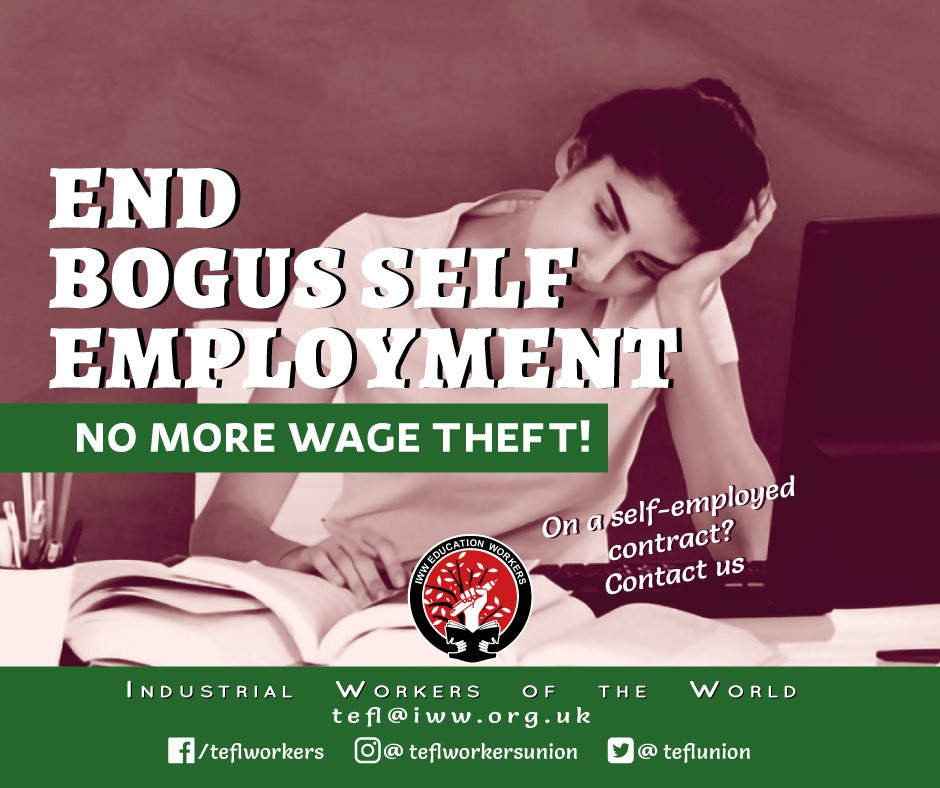The IWW TEFL Workers’ Union has been contacted by yet another teacher who was working under a bogus self-employment contract and, as a result, was not placed on furlough. Moving forward, we will be supporting this worker to collect compensation for their mistreatment.
If you work in a language school and you’re on a self-employed contract, you probably shouldn’t be. You’re missing out on holiday pay and access to other benefits like the right to redundancy pay. Contact the TEFL Workers’ Union at tefl [at] iww [dot] org [dot] uk and we’ll look over your contract and offer advice and support.
I started working in the UK last year on fixed contracts over summer. At the end of summer when I had to find something more permanent, I found a job as a tutor in a local ESOL (English for speakers of other languages*) provider centre where I was given a self-employed contract. This has been my experience working for them.
I was hired immediately after the interview/trial lesson. I was given an offer letter only after requesting one, which stipulated the rate per hour, the beginning date and the schedule. (There are work places which do not offer automatically contracts or any other legally binding agreements, which I find dodgy.)
I was ‘hired as self-employed’ on a fixed schedule with regular meetings and classroom observations. Although I informed the school that I was not familiar with this type of employment, I was only told what was actually interesting for them: I had to pay my own taxes – that is financial relief for us/ the school and as for you, you can do whatever you want, ‘we don’t care’ attitude.
I had to do a lot of paperwork that is required in ESOL (learner reviews, individual assessments and learner profiles) not only for me but also for the previous teacher who had left after a month without doing any of the paperwork. I was not explained properly anything, nor did I have any induction. I was, after all, new to ESOL which, while having certain aspects in common with TEFL (teaching English as a foreign language), is actually quite different and particularly difficult in the pre-entry level (absolute beginner in terms of TEFL) as we had illiterate and pre-literate students in the same class.
There were no course books, no folders with previous materials or pictures and, of course, no projectors. The ultimate in terms of the absurd was when they forbade us (the newer teachers teaching pre-entry level) to communicate and exchange ideas or materials. All the schools I have ever worked with welcomed or even asked of its teachers to communicate and exchange ideas and materials freely.
There was a lot of stress as a result of a massive lack of organisation, rude and unapproachable management with absurd expectations; I found that my job as a teacher was revolving around having papers in order (which in many cases had to be redone as a result of not showing /stating clearly how they wanted the information to be recorded), rather than what was actually going on in class, if students were learning or not, all the things that had been previously important for me.
And in spite of being told that I would be working until July, at the end of November, when they re-configured the classes, I was told abruptly that they did not need me anymore.
In mid-January I was approached by the school again and offered the same job, which I accepted reluctantly, for lack of a better alternative at the time. Although I had hoped that this time they will have a different attitude, things were very much the same – even with a small incentive for us, the teachers, – we found out that we had to re-do all the paperwork since January so that things would look good for an external observation which took place at the beginning of March.
In March 2020, two of the teachers were let go due to Coronavirus crisis with no concern for our situation, although they knew it was our main or sole source of income, while the other two teachers continued working online without this being made known or available as a possibility for everybody.
Secrecy, a lack of openness or fairness and ultimately a lack of professionalism, that was my experience working with this school.
*A note for readers who may not work in the industry: TEFL (“Teaching English as a foreign language”) is for students who live outside of an English-speaking country and TEFL schools are almost always in the private sector. ESOL (“English for speakers of other languages”) is for settled migrants living in an English-speaking country. ESOL schools have traditionally been in the public sector, part of further education institutions, or run by charitable organisations.
